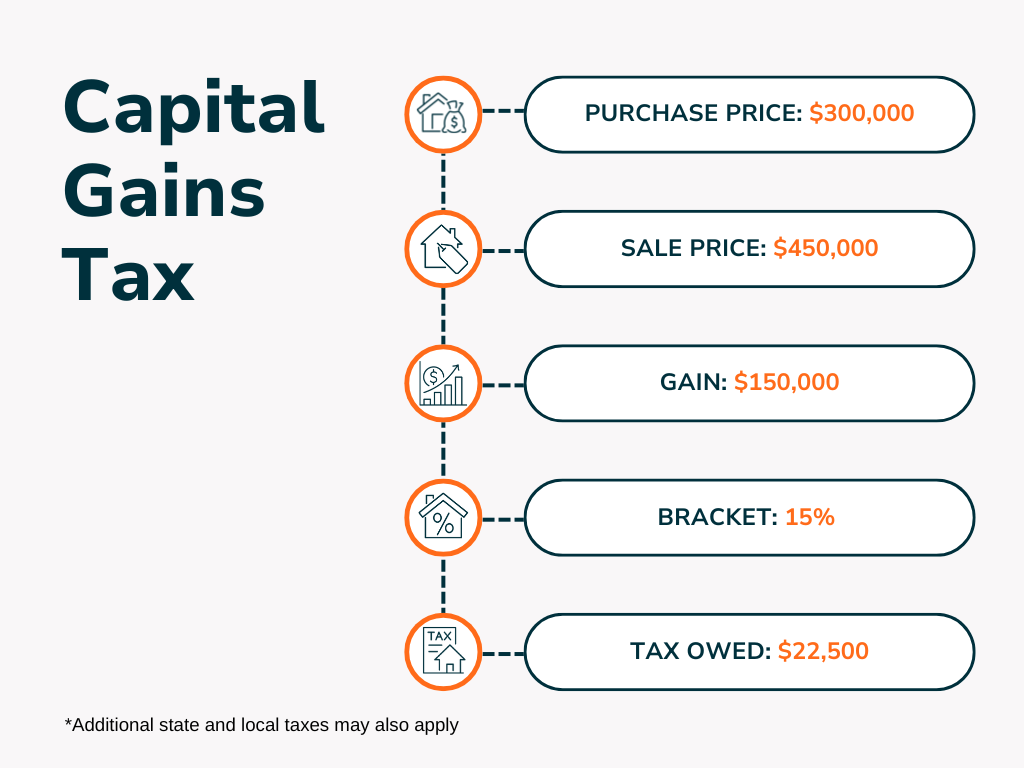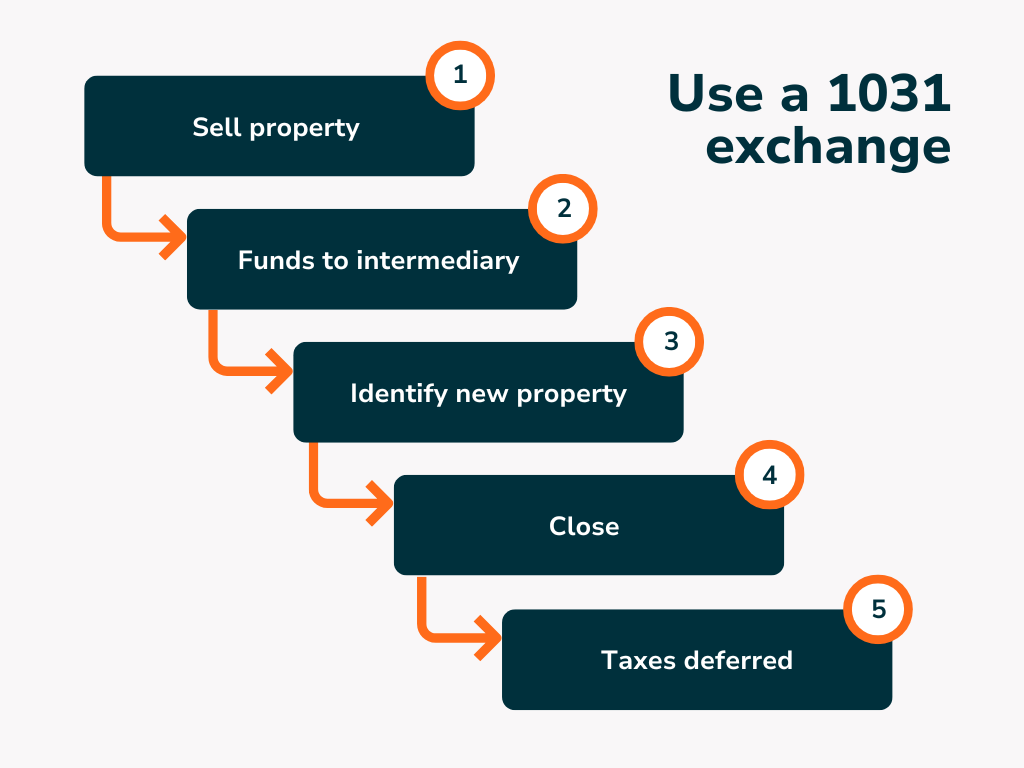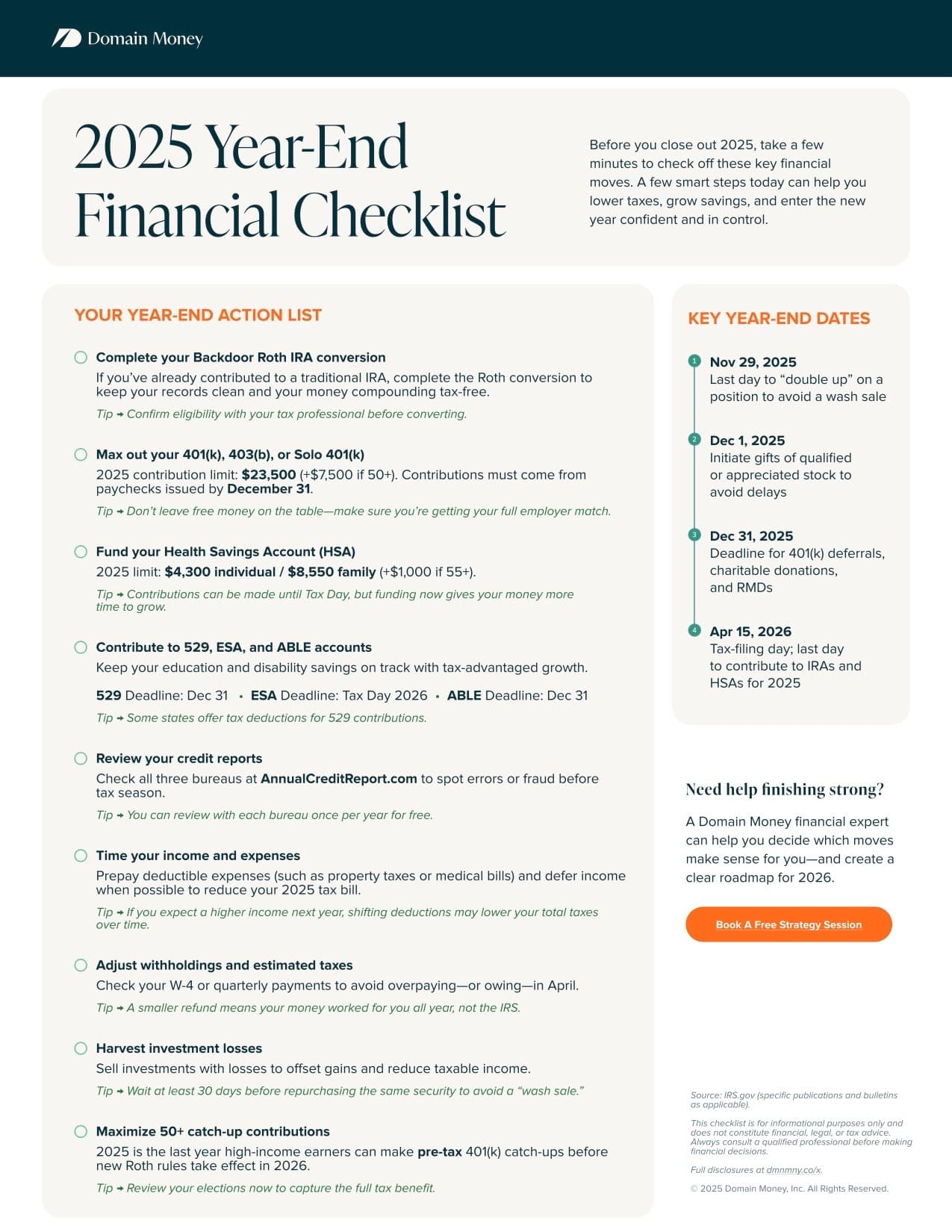Capital gains tax is simply the IRS’s cut of your profit when you sell property. The good news for you is that with the right strategies, you can often reduce or even defer what you owe. Your best move depends on whether the property is your home, an investment, or part of a bigger financial plan. Here are some key takeaways to guide your decision-making:
- Primary residence exclusion = big savings. Live in your home for two of the last five years, and you may be able to exclude up to $250K (single) or $500K (married filing jointly) in gains.
- 1031 exchanges = tax deferral. Investors not using a property for personal use can reinvest profits into another property and delay paying taxes, as long as strict IRS timelines are met.
- Installment sales = flexibility. Spreading payments out over time can lower your tax bracket and ease the tax hit.
- Boosting your cost basis lowers your gain. Closing costs and major improvements increase your property’s basis, shrinking the taxable profit.
- Losses can offset gains. Pairing real estate sales with other investment losses can soften your overall tax bill.
- Charitable giving creates a win-win. Donating appreciated property lets you support causes you care about while cutting your capital gains liability.
- Professional guidance pays off. Complex moves like 1031 exchanges, installment sales, and charitable trusts require precision. A qualified advisor helps you maximize benefits while avoiding IRS pitfalls.
How to avoid capital gains tax on real estate
Selling your property can feel like a win until you start thinking about capital gains tax. The good news is that you have a few options. With the right strategies, you can often reduce what you owe or even avoid taxes altogether, all while staying within the rules.
One of the most common tools is the primary residence exclusion. If you’ve lived in your home for at least two of the last five years, you may be able to exclude up to $250,000 in gains if you’re single, or $500,000 if you’re married and filing jointly. That’s a major difference when you’re ready to cash out on years of equity growth.
If you’re an investor, another powerful option is the 1031 exchange. This strategy lets you defer capital gains taxes by rolling your profits into another “like-kind” property.
These approaches can reshape the financial outcome of your sale. The key is knowing which strategy fits your situation, and often, that means getting guidance before you make a move.
How does capital gains tax work?
When you sell real estate for more than you bought it, the profit is called a capital gain—and the IRS wants its share. That tax, known as capital gains tax, can shrink your earnings if you’re not prepared.
Here’s the simple breakdown:
- Short-term capital gains apply if you’ve owned the property for a year or less. These are taxed at your regular income rate (which can run pretty high—up to 37%).
- Long-term capital gains kick in if you’ve owned the property for more than a year. These are taxed at lower federal rates, usually between 0% and 20%, depending on your income.
Think of it like this: the longer you’ve held onto the property, the friendlier the tax treatment.
A quick example
Imagine you bought an investment property for $300,000 and sold it five years later for $450,000. That’s a gain of $150,000. If you’re married, filing jointly, and your combined income is around $100,000, you’d likely fall into the 15% long-term capital gains bracket. That means you may owe capital gains tax of around $22,500—a number worth planning for.

Why it matters
The IRS does give you some levers to pull. Your primary residence may qualify for big exclusions. Investment properties have their own tax rules. Even details like closing costs and home improvements can reduce the size of your taxable capital gain. The trick is knowing which rules apply to you and how to use them to your advantage.
Where to start
Understanding these basics is the first step to smart tax planning. From there, it’s about tailoring your strategies, whether that’s taking advantage of the primary residence exclusion, exploring a 1031 exchange, or making sure you're tracking every eligible expense.
Domain Money offers personalized, flat-fee financial planning with CFP® professionals who can help you minimize your capital gains tax on real estate through strategies that suit you and your finances. Our advisors will analyze your entire financial picture to help find the best approach for your situation.
Because this isn’t about finding a one-size-fits-all shortcut. You need to find the mix of strategies that match your goals, your property type, and your overall goals.
Strategies to minimize capital gains tax
There are a number of smart, IRS-approved strategies that can help you keep more of your money working for you. Which one makes sense depends on your situation, goals, and timing.
Let’s break down the most effective approaches (promise we'll make it simple).
1. Claim the primary residence exclusion
If you’ve owned and lived in your main home for at least two of the last five years, you may qualify for one of the best tax breaks available: the §121 home-sale exclusion.
- What it means: This capital gains tax exclusion means you can exclude up to $250,000 in capital gains if you’re single, or $500,000 if married filing jointly.
- What qualifies: Not just houses. Condos, townhomes, mobile homes, co-ops, and even houseboats count as long as they were your principal residence.
- Flexibility: The two years don’t need to be back-to-back. You can move out, rent it, then move back in and still qualify.
- Important limits: You generally cannot claim the exclusion if you claimed another §121 exclusion in the prior 2 years, if the home was acquired through a §1031 exchange within the past 5 years, or if you claimed business/rental depreciation (that portion of gain is taxable).
- Partial exclusions: You may qualify for a reduced exclusion if you sell because of work relocation, health, or other IRS-approved unforeseen circumstances (including certain military/government service exceptions).
Think of this as a homeowner’s “get-out-of-tax” card, but one you can only use once every two years.
2. Use a 1031 exchange
For investors, a 1031 exchange is a powerful way to help keep your gains compounding.

- How it works: Instead of paying tax when you sell, you reinvest the proceeds into another investment property. To fully defer the gain, you must generally reinvest all proceeds into property of equal or greater value and replace any mortgage debt.
- Timing is strict: You get 45 days to identify new properties and 180 days to close.
- Rules to follow: To avoid constructive receipt issues, it’s important to engage a qualified intermediary before the sale of your property. You can’t touch the money (it goes to a qualified intermediary), and it only applies to investment properties, not your personal home. All exchanges must be reported on Form 8824.
Loads of investors use this repeatedly to build larger portfolios over time. But if you need some advice here, Domain Money is where you're going to find unbiased, fiduciary guidance with no asset-based fees. Our advisors are here to help you navigate all the complex requirements and timing involved in a 1031 exchange.
3. Choose an installment sale
Rather than getting all your money at once, you can spread payments (and taxes) out with an installment sale.
- How it works: You act as the lender, collecting payments over time (with interest).
- Why it helps: Smaller gains each year may keep you in a lower tax bracket, lowering your overall bill.
- When it’s useful: Common with family sales or trusted buyers.
Risk check: If the buyer defaults, you may need to foreclose. Careful contracts are essential here.
4. Improve your cost basis
Your “cost basis” is what you paid for the property, but it’s not just the purchase price. Boosting your basis reduces the taxable gain.
- Add these in: Closing costs (title insurance, attorney fees, transfer taxes) and major improvements (kitchen remodels, new roof, finished basement, landscaping).
- What doesn’t count: Repairs like fixing a leaky faucet or repainting a room.
Keep receipts and records. That $10,000 bathroom upgrade from a decade ago can still lower your tax bill today.
5. Offset gains with losses
Also known as tax-loss harvesting, this strategy lets you balance real estate gains with losses from other investments like stocks or bonds.
- How it works: Capital losses first offset capital gains. If your losses exceed gains, you can use up to $3,000 ($1,500 if married filing separately) against ordinary income each year, and unused losses carry forward indefinitely.
- Carry-forward benefit: If your losses exceed gains, you can use up to $3,000 per year against ordinary income and carry the rest forward.
- Heads-up: Watch the wash-sale rule for securities (selling and rebuying the same investment within 30 days cancels out the loss).
6. Charitable giving strategies
If you’re already planning to give, donating appreciated property can deliver double benefits: a charitable deduction plus avoiding capital gains tax. Some investors even use charitable remainder trusts to keep receiving income while still reducing their tax burden.
Domain Money’s advisors can help you figure out the best approach for your situation—whether it’s structuring donations, setting up a charitable trust, or timing gifts strategically—so you can support causes you care about while keeping more of your wealth working for you.
The bottom line
There’s no one-size-fits-all answer. The right mix of strategies depends on your property, your timing, and your bigger financial goals. Whether you’re eyeing a move, upgrading your portfolio, or passing wealth to the next generation, smart tax planning can help you keep more of what you’ve earned.
Think of these strategies as tools in a toolbox. The real advantage comes from knowing which one (or combination) to use at the right time.
How to report real estate sales to the IRS
Selling real estate doesn’t end at the closing table. The IRS needs to hear about it, too. Reporting your sale properly isn’t just about avoiding penalties. It’s also about making sure you get credit for every tax break you qualify for.
Here’s what you need to know (and which forms to keep an eye on).
Important forms to know about
Most real estate sales show up on Schedule D and Form 8949. These forms record the nuts and bolts:
- What you sold
- When you bought and sold it
- What you paid (your cost basis)
- What you received at the sale
If you can exclude the entire gain under §121 and you did not receive a Form 1099-S, you generally don’t need to report the sale. Otherwise, you’ll need to complete Form 8949 and Schedule D.
What you’ll get from closing
In most cases, your closing agent files Form 1099-S to report your sale proceeds to both you and the IRS. You should receive your copy by January 31 of the year after the sale.
Pro tip: Don’t wait for that form to land in your mailbox. Start organizing your records (closing statements, receipts for improvements, proof of residency) as soon as the deal closes.
Primary residence exclusion cases
If you’re selling your main home and qualify for the full primary residence exclusion, you may not receive a 1099-S if you provide an acceptable written certification to the closing agent that the sale qualifies for the full exclusion.
But don’t skip the recordkeeping. Keep documents that prove you lived there for two of the past five years (utility bills, mortgage statements, or lease records can all help).
Reporting a 1031 exchange
Doing a 1031 exchange? You’ll also need Form 8824, which details the like-kind exchange. While your qualified intermediary provides much of the info, the IRS holds you responsible for accurate reporting—so double-check everything.
Don’t forget estimated tax payments
If you’ll owe more than $1,000 in taxes and your regular withholding won’t cover it, the IRS expects quarterly estimated payments. Missing them can trigger penalties, even if you pay the full amount when you file your return. Think of it like paying your phone bill — late payments add unnecessary fees.
Keep records longer than you think
Hold onto all related documents for at least three years after filing. If you’re deferring gains with a 1031 exchange or installment sale, keep them even longer. Useful records include:
- Closing statements
- Receipts for improvements and major renovations
- Proof of residency (if claiming an exclusion)
- Correspondence with tax professionals
A well-organized paper trail protects you if questions ever come up down the line.
Common capital gains tax mistakes
Even savvy property owners can trip up on tax rules. Here are the pitfalls to watch for, and how to sidestep them:
- Primary residence rules misunderstood: You must own and live in the home two out of the five years before the sale to qualify. Missing this window can mean losing the exclusion.
- Poor recordkeeping: No receipts, no proof. Keep a running file of renovations and improvements from day one.
- Mishandling a 1031 exchange: Deadlines are strict (45 days to identify, 180 to close). Skipping a qualified intermediary = automatic disqualification.
- Forgetting about state taxes: Federal exclusions don’t always apply at the state level. Know your state’s rules.
- Timing mistakes: Selling too soon could push you into higher tax brackets. Spacing out property sales can help manage your tax bill.
- Overlooking depreciation recapture: On rental properties, the IRS taxes you on depreciation whether or not you claimed it. Don’t ignore it.
Bottom line: A little planning goes a long way. Know the rules, track your records, and don’t rush the process.
When to talk to a professional
Real estate taxes can be tricky, and the stakes are high. Sometimes, the smartest money move isn’t doing it alone but knowing when to bring in backup.
Here are situations where a tax professional or financial planner can save you stress (and potentially money):
- You own multiple properties: Juggling rentals, vacation homes, or investment properties adds layers of complexity that an expert can help untangle.
- You’re considering a 1031 exchange: The deadlines are strict, and missing one can cost you the tax break. This is one strategy where professional guidance isn’t optional; it’s essential.
- Life changes are in play: Divorce, inheritance, or relocating for work can all create tax twists. An expert can flag the rules and opportunities you might overlook.
- You’re a high earner: Taxes like the 3.8% net investment income tax can sneak up on you. A pro can run the numbers so you’re not surprised at filing time.
- You want to get creative: Strategies like installment sales or charitable remainder trusts can work, but only if done precisely. Professionals know how to execute without tripping IRS rules.
- Even in “simple” cases: That home office deduction you’ve been claiming? It could affect your primary residence exclusion later. Better to know now than be blindsided later.
Keeping more of what you earn
Selling real estate doesn’t have to mean losing a big chunk of your profits to capital gains tax. Understanding your options—from the primary residence exclusion to 1031 exchanges—and planning ahead can make a real difference. Keeping detailed records of improvements, knowing the timing rules, and calculating your cost basis accurately can genuinely help you save thousands, whether you’re selling a family home or an investment property.
But complex situations (and even the simpler ones) often benefit from some professional guidance. Tax laws change, and the strategies that worked last year might not apply today. Domain Money’s flat-fee CFP® professionals can help you navigate the rules, choose the right strategies for your circumstances, and create a plan that keeps more of your money working for you.
By planning ahead, keeping records, and seeking expert help when needed, you can minimize capital gains tax, protect your profits, and build long-term wealth. Connect with a Domain Money CFP® professional today and start your tailored tax strategy.
Frequently Asked Questions (FAQ):
What is a simple trick for avoiding capital gains tax on real estate investments?
One common strategy is reinvesting the proceeds from a sold investment property through a 1031 exchange. You must identify the new property within 45 days and close within 180 days to defer capital gains tax.
What is the capital gains loophole in real estate?
The stepped-up basis is a tax provision that can benefit heirs. When someone inherits a property, its value is adjusted to the market price at the date of the death of the decedent. This can reduce or even eliminate capital gains taxes if the property is sold soon after.
Is there a way around capital gains tax on a home sale?
Yes — if you’ve lived in the home as your main residence for at least two of the last five years, you may qualify for the Section 121 exclusion. This allows you to exclude up to $250,000 of gain if single, or $500,000 if married filing jointly, from your taxable income.
What is the 6-year rule for capital gains tax?
If you move out of your primary residence and rent it, the 6-year rule may let you claim the capital gains exclusion for up to six years under certain conditions. This can be a useful strategy if you’re temporarily relocating but want to preserve your tax benefits.









